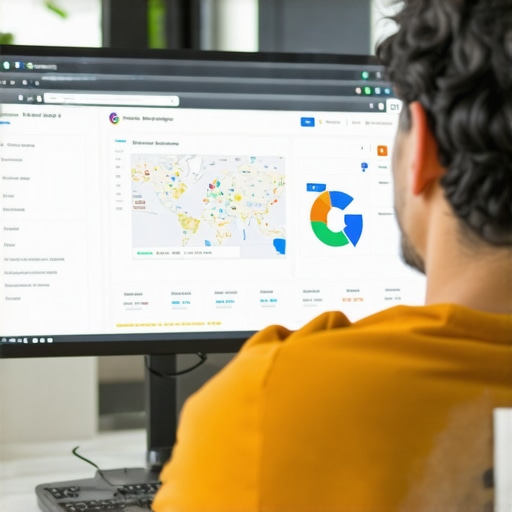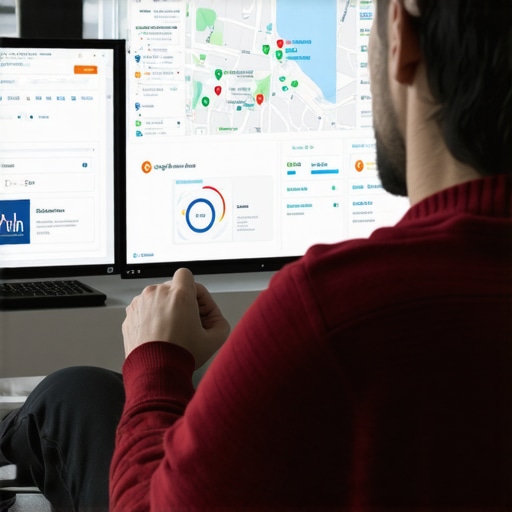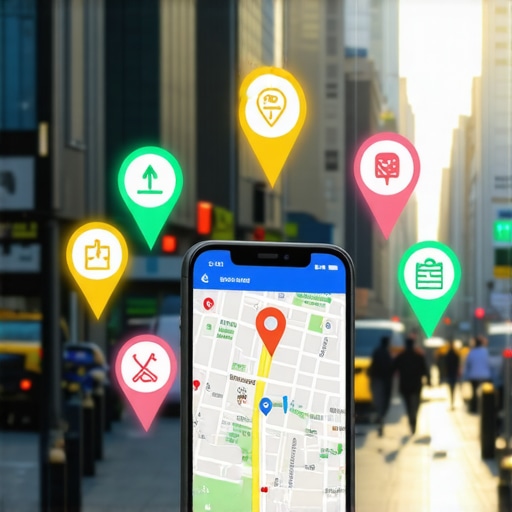How I Discovered the Power of Google Maps Optimization
It all started when I noticed that my local business wasn’t appearing in the top Google Maps results, despite having a well-designed website and active social media. Frustrated, I decided to dive into the world of Google My Business (GMB) support and local SEO strategies. Little did I know, this journey would revolutionize my online presence and attract more customers than I ever imagined.
Understanding the Core of Google Maps Ranking in 2024
After extensive research and trial-and-error, I learned that ranking high on Google Maps depends on several factors, including relevance, distance, and prominence. To optimize my GMB profile effectively, I focused on optimizing my profile with accurate categories, compelling descriptions, and consistent NAP (Name, Address, Phone number) information.
My Secrets to Climbing Google Maps Rankings
One breakthrough came when I implemented Google Maps SEO techniques recommended by industry experts. These include generating genuine customer reviews, posting regular updates, and utilizing local keywords naturally in my posts. I also explored proven strategies for 2025 that focus on building authority and trust in my niche. The results? My rankings improved steadily, and my business started gaining more local visibility.
What Are the Key Challenges in Google Maps Optimization?
Is It Really Possible to Outrank Large Competitors?
This was a question I pondered often. While big companies have more resources, I found that consistent, targeted GMB support and local SEO efforts can level the playing field. By leveraging advanced support tactics and staying ahead of algorithm updates, smaller businesses can indeed climb the rankings effectively.
If you’re serious about boosting your Google Maps presence, I highly recommend exploring dedicated support services or consulting with SEO professionals. Sharing your experiences or asking questions can also help refine your strategy—feel free to leave a comment below!
How Can Local Businesses Harness Cutting-Edge GMB Support in 2025?
In the rapidly evolving landscape of local SEO, staying ahead requires not just basic optimization but leveraging innovative Google My Business (GMB) support strategies. As algorithm complexities grow, traditional methods might not suffice. Instead, integrating advanced tactics—such as utilizing AI-driven review management tools, geo-targeted content, and real-time engagement analytics—can significantly enhance your Google Maps visibility. For comprehensive insights, explore innovative SEO techniques that are shaping the future of local search dominance.
What Are the Nuances of Building Authority for Local SEO?
Authority remains a cornerstone in ranking algorithms. But how do you effectively build it amidst fierce competition? Beyond acquiring genuine reviews and backlinks, focus on creating authoritative content tailored to your local audience. Participating in community events, sponsoring local charities, or engaging with local influencers can boost your credibility. Moreover, optimizing your GMB profile with schema markup and leveraging Google Posts with rich media can establish your business as a trusted local authority. Read more about drive local SEO wins through authoritative signals.
Can Real-Time Data Analytics Transform Your GMB Strategy?
Absolutely. The insights offered by Google My Business analytics are invaluable for tailoring your local SEO efforts. By analyzing customer interactions, search queries, and engagement patterns, you can identify high-performing keywords and optimize your content accordingly. This dynamic approach ensures your business remains relevant and competitive. Implementing tools that integrate with your GMB dashboard can automate data collection and provide actionable insights, leading to smarter decision-making. For a deep dive into data-driven strategies, check out using GMB data effectively.

Are There Hidden Opportunities in Niche Markets for Google Maps Ranking?
Certainly. Niche markets often have less saturated competition, providing strategic advantages for local businesses. By identifying underserved segments within your locality—such as specialized services or unique local traditions—you can tailor your GMB profile and content to target these niches. Using hyper-local keywords and participating actively in community-specific events or forums can further enhance your presence. These efforts not only improve rankings but also foster community trust and loyalty. For tips on niche targeting, consider exploring expert GMB support tailored for niche markets.
Embracing the Complexity of Local SEO in 2024
As I delved deeper into Google Maps optimization, I realized that the landscape is more intricate than I initially thought. It’s not just about keyword stuffing or superficial profile updates anymore; it’s about understanding the nuanced interplay of user intent, local community signals, and the evolving algorithms that Google continually refines. One particular challenge I faced was balancing the need for authoritative backlinks with genuine community engagement, ensuring my efforts felt authentic rather than spammy.
The Power of Personalization and Customer Experience
Over time, I learned that Google increasingly prioritizes personalized search results. This means that engaging with your local audience through personalized content, responding to reviews thoughtfully, and creating a memorable customer experience can significantly influence your rankings. I found that businesses that genuinely listen and adapt to their community’s needs tend to outperform those relying solely on technical SEO tactics. Sharing stories of my own interactions—like hosting local events or offering exclusive community discounts—helped forge stronger connections and boosted my profile’s prominence.
How Do You Measure True Success Beyond Rankings?
Initially, my focus was solely on climbing the Google Maps ladder, but I soon realized that true success comes from authentic engagement and tangible business growth. Tracking metrics like customer inquiries, conversion rates, and community feedback provided a more comprehensive picture of my efforts’ effectiveness. Leveraging tools such as Google My Business insights, I could identify high-impact keywords and customer preferences, enabling me to tailor my marketing strategies more precisely. This holistic approach transformed my perspective from simply ranking higher to building a trusted local brand.
Is There a Hidden Art to Managing Reputation and Visibility?
Absolutely. Reputation management is both an art and a science. I discovered that consistent, transparent communication and proactive review management can prevent negative feedback from tarnishing your image. Moreover, participating in local forums, sponsoring charity events, and sharing success stories in Google Posts can elevate your profile’s authority and trustworthiness. It’s about nurturing a vibrant community presence that Google recognizes as a sign of reliability, which in turn enhances your visibility in local searches. For those interested in mastering this balance, exploring reputation management techniques can be invaluable.
What Are the Future Trends That Will Shape Google Maps Optimization?
Looking ahead, I believe that AI-driven insights and automation will play pivotal roles. Tools that analyze customer behavior, predict trends, and automate routine interactions will become indispensable. For instance, integrating geo-targeted content with real-time analytics can help businesses stay ahead of local competitors. I’m personally experimenting with AI-powered review solicitation and sentiment analysis to refine my strategy continually. As Google advances its algorithms—focusing more on user experience and community signals—adapting proactively is key. To keep up, I recommend exploring innovative SEO techniques that leverage emerging technologies.
Leveraging AI and Automation for Local SEO Mastery
One of the most transformative shifts in Google Maps optimization has been the integration of artificial intelligence and automation tools. These technologies enable local businesses to analyze vast amounts of data, predict trends, and automate routine engagement tasks like review solicitation or responding to customer inquiries. For instance, AI-powered review management platforms can identify negative feedback patterns early, allowing you to address issues proactively, thereby safeguarding your reputation and boosting your prominence in local searches. As Google continues to refine its algorithm to prioritize user experience, employing these advanced tools can give you a significant edge. For a comprehensive overview, explore cutting-edge SEO techniques that harness emerging technologies.
Building Local Authority Through Community Integration
Beyond technical optimization, establishing your authority within the local community can profoundly impact your Google Maps rankings. Participating in or sponsoring local events, collaborating with neighborhood influencers, and engaging in community forums not only boost your visibility but also foster authentic trust. Google’s algorithm increasingly rewards businesses that demonstrate genuine community involvement, translating into higher relevance scores. Consider creating content that highlights your community contributions, sharing success stories, or even hosting local workshops. These efforts, combined with schema markup implementation and rich media in Google Posts, can position your business as a trusted local leader. To deepen your strategies, review your guide to local SEO wins.
Mastering Niche Market Opportunities for Competitive Advantage
One often-overlooked facet of Google Maps optimization is the potential within niche markets. These underserved segments allow you to tailor your GMB profile and content to specific local needs, reducing competition and increasing relevance. For example, if your business specializes in eco-friendly products or traditional crafts, emphasizing these unique aspects with hyper-local keywords can dramatically improve your visibility among targeted audiences. Additionally, active participation in niche-specific community groups or forums can strengthen your authority and foster loyalty. According to industry insights, focusing on niche markets not only enhances rankings but also creates sustainable growth avenues. Discover more about niche targeting at expert support for niche markets.
Harnessing Data-Driven Insights to Refine Your Strategy
Real-time analytics from Google My Business insights provide invaluable guidance for ongoing optimization efforts. By meticulously analyzing customer search queries, engagement patterns, and review trends, you can identify high-impact keywords and content opportunities. For example, if data indicates a surge in searches related to specific services or local events, tailoring your posts and offers accordingly can capture this demand. Integrating analytics platforms with your GMB dashboard enables automated data collection, freeing you to focus on strategic adjustments. This data-driven approach ensures your efforts stay aligned with evolving customer behaviors and algorithm updates, ultimately enhancing your local search dominance. For expert tips on leveraging GMB data, visit using GMB data effectively.

Things I Wish I Knew Earlier (or You Might Find Surprising)
1. Authenticity Trumps Everything
When I first started optimizing my Google Maps listing, I thought that keyword stuffing and fake reviews would do the trick. Turns out, genuine reviews and authentic engagement are what truly boost your visibility. Sharing real customer stories made a huge difference in establishing trust and authority.
2. Community Involvement Matters More Than I Thought
Participating in local events and sponsoring community initiatives not only built goodwill but also improved my local relevance signals. Google seems to reward businesses that are genuinely involved in their neighborhoods.
3. Data Is Your Best Friend
Using Google My Business insights helped me understand what customers are searching for and how they interact with my listing. This data-driven approach allowed me to tailor my content and respond swiftly to trends, keeping me ahead of competitors.
4. Niche Markets Can Be Goldmines
Focusing on underserved niche markets allowed me to stand out without competing head-to-head with larger brands. Hyper-local keywords and tailored services made my profile more appealing to a specific audience, leading to better rankings.
5. Automation Can Save You Time and Effort
Leveraging AI tools for review management and customer follow-ups helped me stay consistent and responsive. Automation doesn’t replace personal touch but amplifies your ability to maintain a positive reputation effortlessly.
Resources I’ve Come to Trust Over Time
- Google’s Official Support Pages: They offer comprehensive, up-to-date guidelines directly from Google, which is crucial for understanding algorithm changes and best practices.
- Moz Local: This platform provides valuable insights into local SEO strategies and helps track your progress. I’ve found their tips on citation building and review management particularly helpful.
- BrightLocal Blog: Their case studies and expert interviews give real-world examples of effective Google Maps optimization techniques. It’s a great resource for staying ahead of the curve.
Parting Thoughts from My Perspective
Looking back, mastering Google Maps optimization in 2024 has been a journey of continuous learning and adaptation. The key takeaway for me is that authenticity and community involvement go hand-in-hand with technical support and data analysis. If you’re serious about boosting your local visibility, remember that it’s not just about rankings but building a trusted brand in your community. If this resonated with you, I’d love to hear your thoughts—feel free to share your own experiences or ask questions in the comments. And don’t forget to check out this guide for even more insights on local SEO success.


Reading through this detailed journey into Google Maps optimization, I can totally relate to the challenge of balancing technical strategies with community engagement. I’ve seen firsthand how genuine reviews and local involvement can elevate a business’s presence far beyond traditional SEO tactics. One thing I’ve found particularly effective is leveraging Google Posts to share local events or success stories, which humanizes the brand and builds trust within the community. What’s everyone’s experience with integrating AI tools for review management? I’ve been experimenting with a few, but I’d love to hear what’s worked well for others and any pitfalls to avoid. It seems automation can be a double-edged sword if not handled thoughtfully, especially when it comes to maintaining authentic interactions.
This post resonated with me, especially the emphasis on authenticity and genuine community involvement in Google Maps ranking. I recall initially thinking that technical SEO alone could boost my local visibility, but it turned out that real engagement and local trust are just as, if not more, important. Implementing community-centered initiatives, like sponsoring local events, not only improved my rankings but also created lasting customer relationships. I’ve been exploring AI tools to streamline review responses, but I worry about losing personal touches. How do others balance automation with maintaining authentic, heartfelt interactions? The insights shared here about leveraging real-time data and niche markets are game-changers. It makes me wonder, what innovative local engagement tactics have others found most effective during 2024? Sharing those strategies could really help small businesses level the playing field against larger competitors.
This article really highlights how crucial authentic local engagement is for Google Maps rankings in 2024. I’ve found that staying involved in community events and sharing genuine stories through Google Posts can make a real difference in building trust and authority. It’s interesting how advanced tools like AI are becoming integrated into review management and customer interaction—I’ve been experimenting with some AI review response templates, but I worry about losing that personal touch. Have others found effective ways to blend automation with authentic community interactions? Also, I’m curious about niche market strategies; implementing hyper-local keywords for specialized services worked well for us in a smaller town, but I’d love to hear more examples from other industries. Building a sense of real community presence seems to be a long-term investment that paid off in our visibility and customer loyalty. How are you balancing tech tools with genuine local engagement in your strategies?
Reading about the journey into Google Maps optimization really hits home for me. I started focusing on similar tactics like consistent NAP info and customer reviews, but I found that engaging directly with the community, such as participating in local events and forums, made a huge difference. One thing I’ve been experimenting with is using Google Posts to highlight local stories and success milestones, which seems to resonate well with our audience. I’m curious—how are others balancing the time between technical optimization and genuine community involvement? I think the long-term sustainability of local SEO comes from authentic interactions as much as from algorithms. Also, with AI tools becoming more prevalent, has anyone found effective ways to ensure these automations still feel personal? I’d love to hear some real-world examples or advice on maintaining that authenticity while leveraging automation to stay efficient.